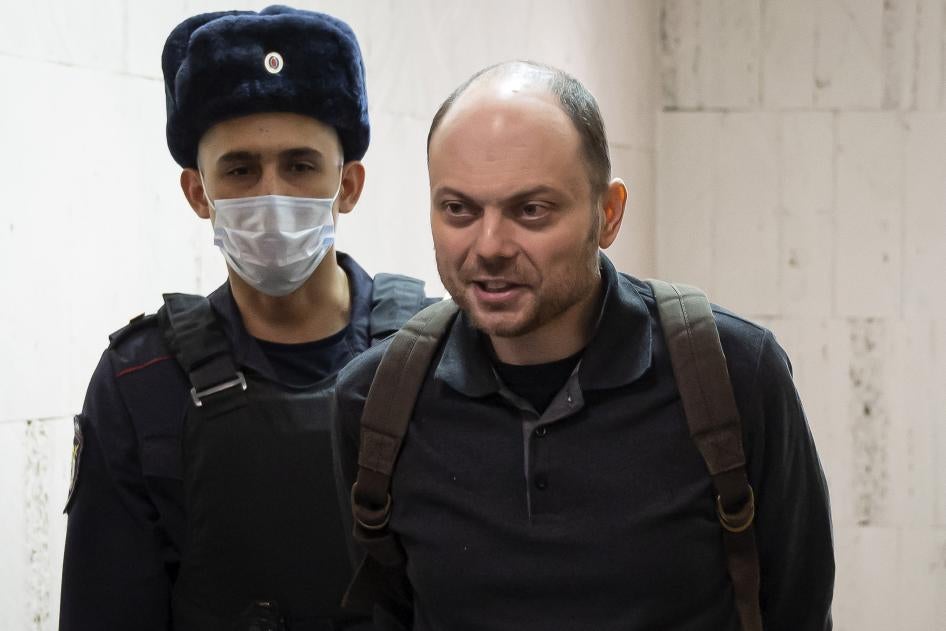Update: On April 17, 2023, the Moscow City Court convicted Vladimir Kara-Murza on combined charges of treason, dissemination of “false information” about the conduct of the Russian Armed Forces, and involvement with an “undesirable organization”, and sentenced him to 25 years in maximum security prison with an additional fine of 400,000 rubles (approximately USD 5,000), restriction of freedom for 1.5 years, and a ban on journalistic activities for 7 years.
“The verdict against Vladimir Kara-Murza is a travesty of justice,” said Hugh Williamson, Europe and Central Asia director at Human Rights Watch. “Russian authorities should immediately vacate the verdict and unconditionally free him.”
(Berlin, April 14, 2023) – Moscow City Court is scheduled to deliver a verdict on April 17, 2023 in the criminal trial against the prominent Russian opposition politician Vladimir Kara-Murza, Human Rights Watch said today. Russian authorities should immediately and unconditionally release Kara-Murza, who has been arbitrarily detained for the past year, as well as other peaceful civic and political activists arbitrarily detained in Russia.
On April 6, the prosecutor asked the court to sentence Kara-Murza to 25 years in prison on combined charges of treason, dissemination of “false information” about the conduct of the Russian Armed Forces, and involvement with an “undesirable organization,” stating that Kara-Murza was “an enemy and must be punished.” The trial was held behind closed doors, but Kara-Murza’s lawyers were able to talk to mass media.
“Vladimir Kara-Murza has been detained, prosecuted, and is facing a monstrous prison term for no more than raising his voice and elevating the voices of others in Russia who disagree with the Kremlin, its war in Ukraine, and its escalating repression within Russia,” said Hugh Williamson, Europe and Central Asia director at Human Rights Watch. “The Kremlin’s persecution of Kara-Murza, which is part of its efforts to demoralize and quash civic activism, should be condemned in the strongest possible terms.”
Kara-Murza is a longstanding proponent of democratic values, and a vocal opponent of the current Russian government and of the full-scale Russian invasion of Ukraine. He has spoken before political bodies throughout Europe, in the United States, and at many international and intergovernmental forums, including the United Nations.
He was a key advocate for the US Magnitsky Act, which sets out sanctions for human rights violators in Russia, and called for sanctions to be imposed on culpable Russian officials. The Magnitsky Act, named for a Russian tax advisor who uncovered a high-level corruption scheme and died after being unjustly imprisoned and denied medical assistance, gave rise to the Global Magnitsky regime, which provides for a dedicated sanctions regime for human rights violators around the world. Kara-Murza was also a close friend of the murdered Russian opposition politician Boris Nemtsov.
Kara-Murza was arrested on April 11, 2022, on the trumped-up charge of spreading “false information” about the Russian Armed Forces. In August, Russian authorities added the charge of involvement in an “undesirable” foreign organization, and in October they added the treason charge for his public criticism of the Russian authorities in the international arena.
The charges are based on numerous repressive amendments to Russian laws that have been introduced over the past decade, providing the authorities with a variety of provisions to use against government critics who engage in legitimate political speech or activism.
All of the charges against Kara-Murza are unfounded and constitute blatant persecution for his entirely peaceful exercise of freedom of expression, Human Rights Watch said. On March 3, the US government designated six people, including three judges, for sanctions due to their role in Kara-Murza’s arbitrary detention.
Kara-Murza’s health has deteriorated in detention. In March, he was unable to attend a court hearing due to polyneuropathy, a condition affecting multiple peripheral nerves simultaneously, which his lawyer attributed to two severe poisonings he survived, in 2015 and 2017. Bellingcat investigative journalists have reported that the poisonings were most likely orchestrated by the Russian Federal Security Service (FSB), and Russian authorities have never investigated either attempted killing.
In his final statement to the court, Kara-Murza compared the prosecution’s “enemy” rhetoric to that of Stalin’s Great Terror of the 1930s. He rejected the accusations against him and stated that he stands by every word for which he was incriminated. “Not only do I not repent any of this, I am proud of it,” he told the court, “[F] or speaking out against the war in Ukraine. For many years of struggle against Vladimir Putin’s dictatorship. For facilitating the adoption of personal international sanctions under the Magnitsky Act against human rights violators.”
He said that he knew what verdict awaited him, calling it the price for refusing to be silenced in Russia. He expressed hope that the day would come when Russian society would “open its eyes and will be “horrified by the … crimes committed in its name.” He said that would mark the beginning of the healing and rebuilding process for Russia and “its return to the community of civilized nations.”
Kara-Murza’s wife, Evgenia Kara-Murza, referred to his persecution as an act of vengeance and called his trial Kafkaesque, noting that his defense team was barred from presenting evidence. She called the threat of the quarter-century in prison an act of intimidation against his family and all Russians who oppose the Kremlin.
“If convicted on any of these charges, the verdict would be yet another outrageous miscarriage of justice against a peaceful political opponent of the Kremlin’s regime,” Williamson said. “Those behind this disgraceful farce bear individual responsibility for their role in this flagrant denial of justice, and should face further sanction and punishment for their actions.”








